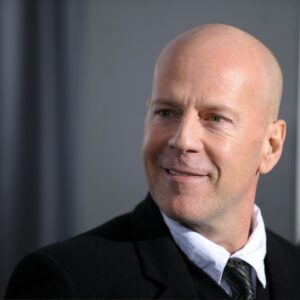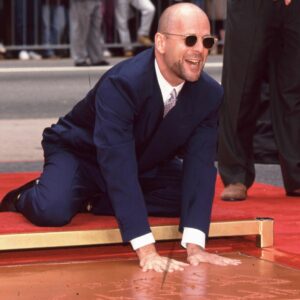In the pantheon of iconic figures who have shaped the modern world, few names carry the weight of both personal sacrifice and political struggle as powerfully as Winnie Mandela. Her legacy, woven through the turbulent history of apartheid in South Africa, remains a subject of controversy, reverence, and passionate debate. As a fierce anti-apartheid activist, an unwavering wife to Nelson Mandela, and a woman who carved her own path amidst the oppressive political climate, Winnie’s story is not only a pivotal chapter in South Africa’s fight for freedom, but also a complex narrative of resilience, defiance, and personal turmoil. For actress Jennifer Hudson, stepping into the shoes of this larger-than-life figure was no small feat. Hudson’s portrayal of Winnie in the 2011 biographical film Winnie Mandela marks a defining moment in her career—a nuanced performance that both honors the figure of Winnie and explores the depths of her emotional and political life.
The Role of Winnie Mandela: A Historical and Emotional Portrait
Winnie Mandela, born in 1936 in the small rural village of Mbongweni, became synonymous with the resistance against South Africa’s brutal apartheid regime. As the wife of Nelson Mandela, who was imprisoned for 27 years for his activism, Winnie herself emerged as a symbol of defiance in her own right, becoming the public face of the anti-apartheid movement during his absence. Her unapologetic stance against oppression, combined with her controversial political decisions, has made her both a beloved and divisive figure in South African history.
A woman who had faced the brutality of the apartheid system firsthand, Winnie Mandela’s life was one of political activism, personal sacrifice, and personal loss. From her fiery speeches to her time spent in prison and house arrest, Winnie navigated a world in which her personal and political worlds collided in often painful and profound ways. As a political figure, she was often called upon to defend her actions, facing charges of violence and corruption, but never swaying from her belief in the cause. This complex portrait of a woman shaped by both adversity and ideology makes her an ideal candidate for a biographical film—one that would not only explore her activism but also delve into the emotional landscape of a woman navigating the sacrifices that come with living in the spotlight of political struggle.
The film Winnie Mandela was a chance to showcase this multifaceted figure in all of her complexity. Directed by Darrell Roodt, the film sought to provide a nuanced look at Winnie’s life, not as a saint or a villain, but as a woman whose journey was deeply entangled with the struggles of the nation. At the heart of the film was the daunting task of casting an actress who could embody both Winnie’s public persona and her private emotional complexities.
Jennifer Hudson’s Preparation for the Role: A Commitment to Understanding the Icon
Jennifer Hudson, known for her powerhouse voice and striking on-screen presence, was an unexpected but ultimately inspired choice for the role of Winnie Mandela. At the time of her casting, Hudson had already won an Academy Award for her performance in Dreamgirls (2006) and had established herself as a force to be reckoned with in Hollywood. However, portraying a figure as iconic and complex as Winnie Mandela required far more than just star power—it demanded a deep emotional and intellectual engagement with the role.
To prepare for the role, Hudson threw herself into research, determined to understand the full breadth of Winnie’s life and the political landscape in which she existed. Hudson had to capture not just the historical facts of Winnie’s journey, but also the emotional layers of a woman who endured decades of separation from her husband, intense scrutiny from the press, and the heavy weight of a nation’s expectations. As Hudson later explained in interviews, she knew that to truly do justice to Winnie’s legacy, she had to go beyond the surface and tap into the raw, emotional core of her subject.
Hudson’s preparation involved intensive research into Winnie’s life, from her early days as a social worker to her involvement with the African National Congress (ANC), and later, her time as a political leader in South Africa. She read extensively about the history of apartheid, the conditions that shaped Winnie’s actions, and the personal struggles she faced. Hudson also sought out people who were close to Winnie, including her family and friends, to gain insight into the woman behind the headlines. This level of research, combined with Hudson’s natural ability to immerse herself in a role, proved essential in giving her portrayal of Winnie a level of authenticity and depth that audiences could connect with.
Additionally, Hudson met with Winnie Mandela’s daughter, Zindzi Mandela, to gain a deeper understanding of her mother’s life. These intimate conversations helped Hudson further humanize the portrayal, allowing her to embody not just the historical figure but the private woman behind the public image. This focus on detail and authenticity was crucial in making the character of Winnie Mandela come alive on screen.
Physical Transformation: Becoming Winnie
One of the more striking elements of Hudson’s performance was her physical transformation into Winnie Mandela. While Hudson and Winnie may not share an exact physical resemblance, the actress worked diligently to alter her appearance in order to embody the role more convincingly. Costume designers and makeup artists worked with Hudson to create a look that mirrored Winnie’s iconic style throughout the years—whether it was her more formal political attire or her more casual, everyday clothing.
But it was Hudson’s body language that truly sold the transformation. Winnie Mandela was a woman who carried herself with immense confidence, and Hudson had to adopt a posture and presence that conveyed both strength and vulnerability. From the way she moved, to the way she interacted with those around her, Hudson’s portrayal of Winnie captured the essence of her subject’s formidable personality.
In interviews, Hudson discussed how her physical transformation was as much about embodying Winnie’s emotional journey as it was about appearance. She wanted to capture the physical and emotional toll that Winnie endured over the years. Through the role, Hudson sought to reveal the inner workings of a woman who had lived through incredible hardship, while still maintaining her composure and strength.
Jennifer Hudson’s Portrayal of Winnie Mandela: A Layered Performance
Hudson’s portrayal of Winnie Mandela in the film is an intense and emotional journey that captures the complex interplay of strength and vulnerability that defined the real woman. Winnie Mandela was, at times, a fierce and unyielding political figure; at others, she was a woman plagued by the isolation and heartache of separation from her husband, the constant threats of violence, and the emotional toll of fighting for a cause that demanded personal sacrifice at every turn. Hudson’s ability to show this duality—between the public persona of the activist and the private struggles of a mother and wife—was what truly made her performance stand out.
In the film, Hudson takes viewers through some of the most defining moments of Winnie’s life. One of the most powerful scenes shows Winnie enduring interrogation and imprisonment, capturing both her emotional devastation and her unwavering resolve. Another key moment is her public speeches, where Hudson channels Winnie’s passionate rhetoric with precision, embodying the conviction and fire that made her a symbol of resistance for millions.
But perhaps what makes Hudson’s portrayal of Winnie Mandela so compelling is her ability to bring out the tenderness and vulnerability of the character. In scenes with her children, in her moments of reflection and personal anguish, Hudson allows the audience to see the softer side of Winnie—a side that had been largely overlooked by the media in favor of her fiercer, more public persona. Hudson’s Winnie is not merely a political figure but a woman who experienced profound emotional pain and personal loss, and who faced immense pressure from both the apartheid regime and her own people.
Hudson’s portrayal of Winnie also delves into the internal conflict that defined much of the real Winnie Mandela’s life. The film does not shy away from depicting the contradictions in Winnie’s actions—her fierce commitment to the cause, but also the controversial decisions she made that drew criticism even from within the anti-apartheid movement. Hudson captures these complexities with sensitivity and nuance, never reducing Winnie to a mere hero or villain, but instead portraying her as a fully realized, deeply human figure caught in the crosscurrents of history.
The Legacy of Winnie Mandela in Film and Beyond
Winnie Mandela is not just a biographical film; it is a cinematic exploration of a woman who embodied the contradictions and complexities of the fight for freedom. Jennifer Hudson’s portrayal of Winnie is a testament to her acting range and her ability to capture the emotional and political depth of one of the 20th century’s most complex figures. In doing so, Hudson offers audiences not just a glimpse into the life of an iconic activist but also an invitation to reflect on the personal cost of political struggle.
Ultimately, Jennifer Hudson’s performance as Winnie Mandela stands as one of the most significant of her career—a masterclass in acting that balances historical accuracy with emotional depth. As we continue to reflect on the legacy of Winnie Mandela and the wider struggle for racial equality, Hudson’s portrayal ensures that the story of this remarkable woman will continue to resonate for generations to come. In capturing both the power and the vulnerability of Winnie Mandela, Hudson has helped immortalize a figure whose life, though fraught with controversy, is undeniably tied to the spirit of resistance and the ongoing fight for justice.





